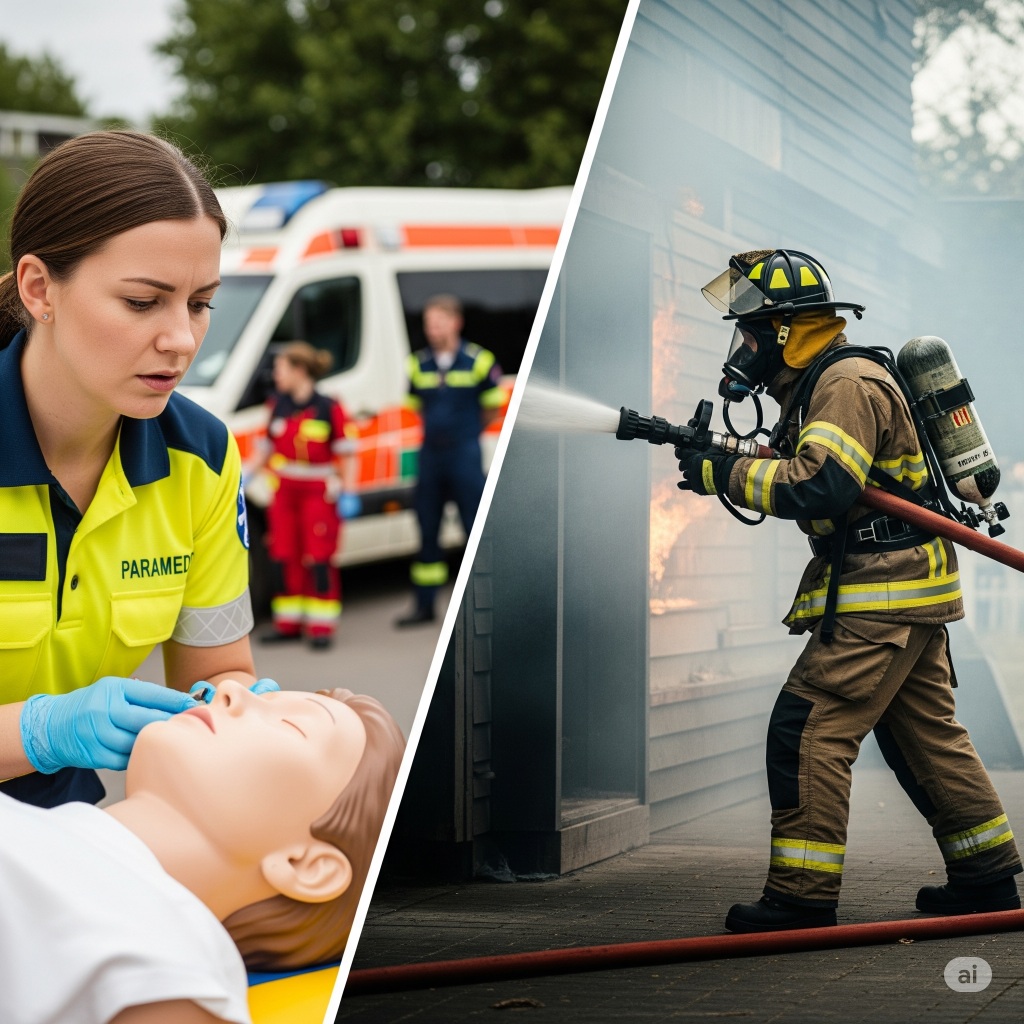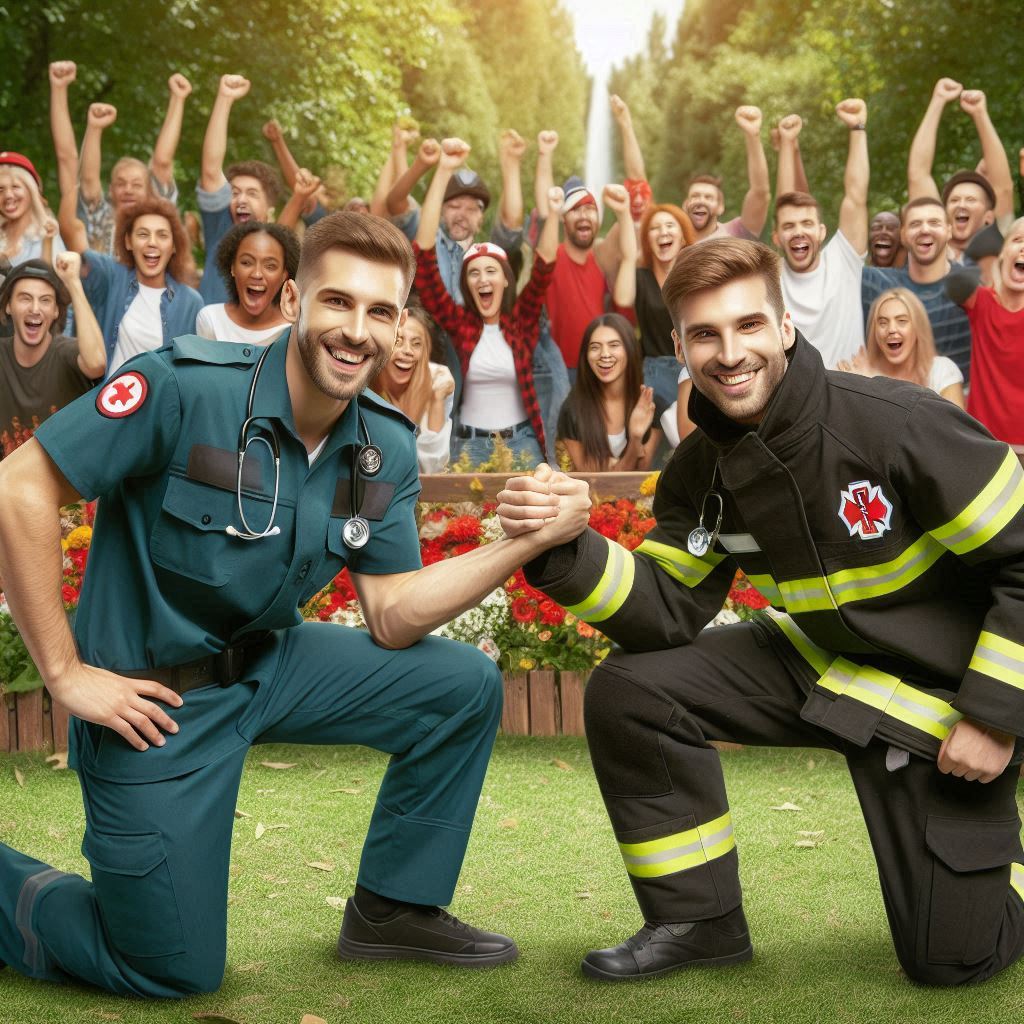
When deciding between a career as a paramedic or a firefighter, it’s essential to understand the unique roles each profession plays in emergency response. As a paramedic, I’ve experienced firsthand the critical care and medical expertise required to save lives in high-pressure situations. On the other hand, firefighters are the brave souls who rush into burning buildings to rescue those in peril.
Both paramedics and firefighters are heroes in their own right, but the paths to becoming one differ significantly. While paramedics focus on providing medical assistance and stabilizing patients, firefighters are trained in fire suppression and rescue operations. Whether you’re drawn to the adrenaline of firefighting or the precision of emergency medical care, the decision between paramedic or firefighter ultimately comes down to where your passion lies.
Key Takeaways
- Paramedics focus on providing critical medical care and stabilization to patients in various emergency settings.
- Communication, quick decision-making, and continuous training are vital aspects of the paramedic profession.
- Firefighters engage in firefighting, rescue operations, and providing medical aid, requiring physical fitness and specialized skills.
- Teamwork, adaptability, and ongoing training are crucial for firefighters to effectively respond to emergencies.
- Paramedics require formal education, certification, clinical experience, and specialized training to excel in their roles.
- Firefighters undergo training at firefighter academies, emergency medical training, ongoing training, physical fitness maintenance, and specialized skill development for their profession.
Understanding the Role of a Paramedic
As a paramedic, emergency medical care is my top priority. I’m trained to provide immediate medical attention to those in critical condition. Quick decision-making and medical skills are crucial when responding to accidents, injuries, or medical emergencies.
Paramedics like me are equipped to handle a range of situations – from administering life-saving medications to performing CPR and advanced airway management. Prioritizing patient care and stabilization is essential to ensure the best possible outcomes.
Communication plays a vital role in my job as a paramedic. Coordinating with healthcare professionals and providing detailed patient reports are key aspects of the role. Working under pressure and in high-stress environments is a daily reality, but it’s all part of the job when saving lives is at stake.
Continuous training and education are necessary to stay updated on the latest medical advancements and techniques. Teamwork is also crucial, as paramedics often work alongside firefighters, police officers, and other first responders to ensure a coordinated and efficient response.
In summary, being a paramedic is not just a job; it’s a calling. The ability to make split-second decisions, provide critical care, and comfort those in need are all part of what makes this career so rewarding and challenging.
Understanding the Role of a Firefighter
Firefighters play a crucial role in our communities, responding to various emergencies beyond fires. They are trained to handle a wide range of situations, from extinguishing fires to providing medical aid and conducting rescues. Time is of the essence in their line of work, as they often face life-or-death scenarios where quick decisions are vital.
Firefighters must be physically fit to carry out their demanding duties effectively. They undergo rigorous training to develop the necessary skills to operate in challenging environments and ensure the safety of individuals in distress. Their dedication and bravery are fundamental to their role, as they put themselves at risk to protect others.
Teamwork is at the core of firefighting, as coordination and communication are essential during emergency responses. Collaboration with other first responders, such as paramedics and law enforcement, is key to ensuring a comprehensive and efficient approach to emergencies. Effective communication can make a difference in saving lives.
Being a firefighter is more than just putting out fires. It’s about serving the community, responding to crises, and providing support in times of need. The diverse nature of their responsibilities requires versatility and adaptability, as they never know what challenges each day may bring.

Training and Education for Paramedics
Becoming a paramedic requires specialized training and education to handle medical emergencies effectively. Here are some key points to consider in the training and education process:
- Formal education: I started my journey by completing a formal education program approved by the state. This program typically includes coursework in anatomy, physiology, and medical procedures.
- Certification: After completing the formal education program, I obtained certification as a paramedic by passing the National Registry of Emergency Medical Technicians (NREMT) exam.
- Clinical experience: Hands-on experience through clinical rotations in hospitals and ambulance ride-alongs are vital in preparing for real-world emergency situations.
- Continuing education: Staying updated with the latest advancements in emergency medicine is crucial. Regularly attending continuing education courses helps me maintain my skills and knowledge.
- Specialized training: Some paramedics pursue additional training in areas such as advanced cardiac life support (ACLS), pediatric life support (PALS), or trauma care to enhance their expertise.
- Physical fitness: Just like firefighters, paramedics need to maintain physical fitness to perform demanding tasks during emergencies. Regular exercise is essential to stay in optimal shape.
- Critical thinking: Quick thinking and decision-making are fundamental skills for paramedics in high-pressure situations. Training programs focus on developing these skills to ensure efficient and effective emergency responses.
By investing in comprehensive training and education, paramedics can confidently provide life-saving care to those in need.
Training and Education for Firefighters
When it comes to Training and Education for Firefighters, it’s essential to highlight the rigorous preparation required for this demanding profession. As a firefighter, I know firsthand the importance of being well-equipped with the right knowledge and skills to handle a wide range of emergencies effectively. Here are key points to consider regarding training and education for firefighters:
- Firefighter Academy: One of the primary paths to becoming a firefighter is through completion of a firefighter academy program. These programs typically cover firefighting tactics, hazardous materials response, building construction, and other essential topics.
- Emergency Medical Training: Many firefighters are also trained as emergency medical technicians (EMTs) or paramedics. This medical training is crucial for providing immediate medical care at emergency scenes.
- Ongoing Training: Firefighters are required to undergo regular training to stay updated on the latest firefighting techniques, equipment operation, and safety protocols. Continuous training ensures readiness for any situation.
- Physical Fitness: Maintaining physical fitness is a cornerstone of a firefighter’s training. Endurance, strength, and agility are key components to handle the physical demands of firefighting and rescue operations.
- Specialized Skills: Firefighters may also pursue specialized training in areas such as technical rescue, hazardous materials response, or urban search and rescue. These skills enhance their ability to respond to complex emergencies effectively.
- Certifications: Firefighters often need certifications such as Firefighter I and II, Hazardous Materials Technician, and Emergency Vehicle Operator to demonstrate their proficiency in various aspects of the job.
- Apprenticeships and Mentoring: Some firefighters benefit from apprenticeship programs or mentoring relationships to gain practical experience and guidance from seasoned professionals in the field.
The multifaceted training and education requirements for firefighters prepare them to respond with skill and confidence to a wide array of emergencies, safeguarding lives and property in their communities.
Making the Decision: Paramedic or Firefighter
When deciding between becoming a paramedic or a firefighter, it’s essential to consider the key differences in these rewarding professions.

Paramedic:
- Focus on medical care and emergency response in various settings.
- Provide immediate medical attention and life-saving interventions.
- Work in ambulances, hospitals, and emergency medical services.
- Require strong communication skills and the ability to stay calm under pressure.
- Combat fires and respond to various emergencies to protect lives and property.
- Utilize specialized equipment and techniques to extinguish fires.
- Engage in rigorous physical training to maintain fitness for demanding tasks.
- Often involved in community outreach and fire prevention programs.
Both professions offer unique challenges and opportunities for personal growth. Whether drawn to the medical aspect of emergency response as a paramedic or the physical demands of firefighting, each role plays a crucial part in safeguarding communities.
As I weigh these considerations, I recognize the impact I can make in either role and the difference I can contribute to public safety and community well-being. It’s a decision that requires thoughtful reflection on personal strengths, passions, and career goals to determine the most fulfilling path forward.
Conclusion
Considering a career as a paramedic or firefighter involves weighing the distinct responsibilities and opportunities each profession offers. Paramedics focus on medical care and emergency response, while firefighters tackle fires and various emergencies. Both roles require strong communication skills, physical fitness, and community engagement. Each path presents unique challenges and chances for personal growth. By carefully assessing individual strengths, passions, and career aspirations, one can make a meaningful impact on public safety and community well-being. Ultimately, the decision between becoming a paramedic or firefighter rests on personal preferences, goals, and the desire to serve and protect others.
Frequently Asked Questions
1. What are the main differences between being a paramedic and a firefighter?
Paramedics primarily focus on providing medical care and responding to emergencies, while firefighters primarily combat fires and handle various emergency situations.
2. What skills are important for both paramedics and firefighters?
Strong communication skills, physical fitness, and community engagement are essential for both paramedics and firefighters.
3. How can individuals choose between pursuing a career as a paramedic or a firefighter?
Consider personal strengths, passions, and career goals to make an informed decision based on the unique challenges and opportunities each profession offers.
4. What impact can individuals have in these roles?
Individuals can make a significant impact on public safety and community well-being by carefully considering their career path as a paramedic or firefighter.
